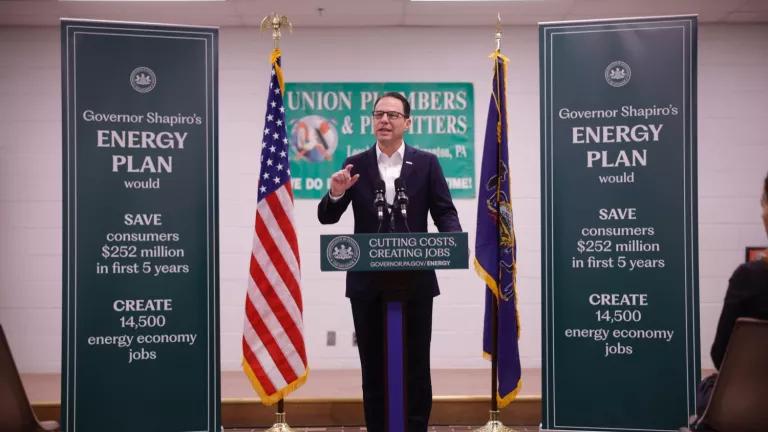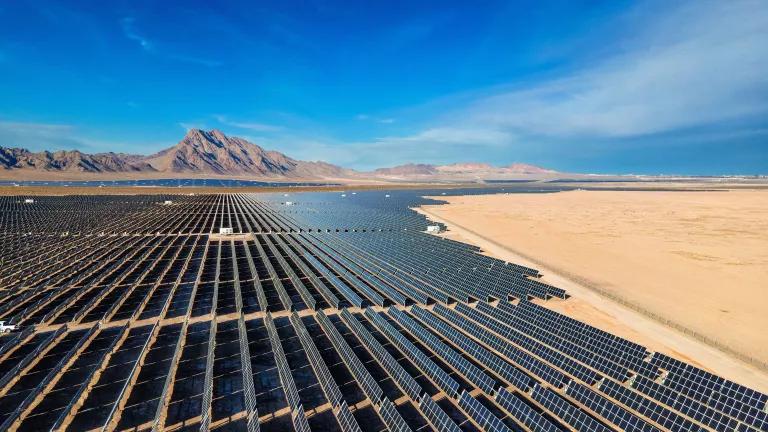5 Key Reasons to Stop the Mountain Valley Pipeline

It’s time to stop the Mountain Valley Pipeline system, aka MVP, and its dangerous attempts to transport dirty fracked gas across Appalachia. This massive dirty energy project makes no more sense today than when it was first proposed more than five years ago. It would keep communities dependent on dirty fossil fuels for generations while jeopardizing sensitive rivers and streams, drinking water sources, the climate, and local communities.
MVP consists of two segments: the 303-mile “mainline” and the “Southgate extension.” In total it's designed to transport gas approximately 375 miles, starting in the extraction fields of northern West Virginia, blasting through the Blue Ridge mountains, and crossing Virginia before reaching its end in North Carolina.
Here are the 5 top reasons it should be stopped:
1. No one needs its dirty gas
MVP is an orphan pipeline in search of a purpose. It was initially scheduled to be completed by December 2018 and the owners recently asked federal authorities to give them until October 2022. There still doesn’t appear to be a market for its gas. While its owners state the pipeline “has secured firm commitments for the full capacity of the MVP project under 20-year contracts,” we believe MVP gas is only 35.5 percent committed. Here's why the 100 percent claim is misleading:
Four corporate customers appear to have committed to buy 35.5 percent of MVP's capacity. These companies are utilities or affiliates of utilities, so some day they might actually use gas from MVP. But the remaining 64.5 percent of MVP’s capacity has been claimed by EQT, America's largest natural gas producer. EQT doesn't consume natural gas in its line of business, so it's a safe bet that it will never need to buy gas from a pipeline.
In essence, in committing to “buy” gas from MVP, EQT committed to absorb any financial risk if up to 64.5 percent of the pipeline’s capacity goes unsold. This is a massive speculative gamble, which may be why EQT’s CEO recently stated that it hopes to sell the company’s MVP commitment “at cost.”
Recent reports indicate that MVP has been talking to utilities Duke Energy and Dominion Energy about offloading this excess capacity. Duke and Dominion were, until this July, trying to build their own speculative fracked gas transport project, the Atlantic Coast Pipeline (ACP), but it collapsed under the oppressive weight of a ballooning price tag (from $4.5 billion to $8 billion) and the legal challenges it faced under a long list of important laws (the Natural Gas Act, the Endangered Species Act, the National Environmental Policy Act, the Clean Water Act, the Clean Air Act, and more).
Duke and Dominion didn’t need the gas that would have been transported by ACP, and expert analysis shows that they don’t need the gas transported by MVP, either. In recent years, these utilities have lowered their gas demand estimates.
Even the “need” for the committed 35.5 percent is suspect. The existing Transco pipeline system has said that it can handle the region's capacity needs. And the four current MVP customers are all affiliates of companies that own the pipeline through its joint venture, leading to a blatant self-dealing situation that poses risks to consumers in the form of higher rates and little benefit. Most recently, one of them, ConEd of New York, stated that it may sell its stake, because their view on natural gas has “largely changed” and gas is “no longer ... part of the longer-term view."
Despite being advertised as a benefit to domestic gas consumers, two years before MVP was approved by the Federal Energy Regulatory Commission (FERC) there was talk of exporting some of its gas to India, benefiting corporate shareholders while U.S. communities face the environmental risks.
Lack of need was a key reason why former FERC commissioner Cheryl LaFleur voted to reject the MVP project in 2017, and the market has, if anything, become even less appetizing since then. There is simply no documented need for gas to be transported by MVP, which means no need for the pipeline.
2. MVP’s already an environmental disaster
Construction on the MVP mainline has already severely harmed clean water sources across Appalachia. To date, the owners have agreed to pay over $2 million in penalties for more than 300 water quality violations cited by Virginia and West Virginia. And now there are allegations of even more violations.
It turns out that no other large pipeline has ever been approved across this many miles of steep slopes and high landslide risk areas. MVP was designed to pass through more than 200 miles of “high landslide susceptibility,” and steeper slopes typically mean more threats to clean rivers and streams as well as increased risks of pipeline explosions.
Fortunately, North Carolina officials have taken a more cautious, even skeptical approach with the Southgate extension. They wisely realized its construction “would unnecessarily risk impacting high-quality waters and protected and critical drinking water supplies of North Carolinians,” leading them to recently deny MVP a water quality permit necessary to build the Southgate extension.

3. MVP would be a climate bomb
It’s been estimated that the full life cycle greenhouse gas (GHG) emissions (excluding construction emissions) generated by the MVP mainline alone would be almost 90 million metric tons annually. This is equivalent to the emissions from 23 average U.S. coal plants or over 19 million passenger vehicles driven every year. The states that might get gas from MVP—North Carolina, Virginia, New York, and Florida—can and should instead be slashing climate pollution and creating clean energy jobs for local workers—not contributing to locking in dirty fossil energy for another 40-50 years.
4. MVP’s costs are out of control
MVP has been called “the most expensive proposed pipeline in the United States on a cost per mile basis.” Over the past five years, the price tag for the mainline has ballooned from $3.5 billion to $6.2 billion. The Southgate extension is currently estimated to cost an additional $470 million, for a current total estimate of more than $6.6 billion. When combined with the risk that some of these costs could be passed onto utility customers, these ballooning costs should be concerning for all cost-conscience energy consumers, investors, and lenders.
Meanwhile, MVP is allegedly not paying its bills. MVP’s construction contractor recently sued the pipeline owners, claiming cost overruns caused by delays are the result of the pipeline owner’s poor planning and legal violations. The construction company is asking that the pipeline be sold to pay its bills. MVP’s majority owner, EQM Midstream Partners, recently received a Negative rating outlook from FitchRatings based on the uncertainty and risk from “regulatory and environmental challenges with multiple delays and cost overruns” and earlier this year S&P Global Ratings downgraded EQM Midstream Partners LP's issuer credit rating and issue rating on its senior unsecured debt to BB-.
And while some MVP proponents argue there will be economic benefits in the form of manufacturing jobs brought to the region, analysis has found that there is no support for such claims.
5. MVP’s in legal trouble
MVP has faced a number of lawsuits alleging violations of our bedrock environmental laws, including the Endangered Species Act, the Clean Water Act, and the National Environmental Policy Act. As a result, it lacks needed federal permits, putting construction on hold for both the mainline and the Southgate extension for the foreseeable future. While FERC approved the extension in June, it prohibited any construction based on the uncertainty regarding if and when MVP’s mainline will receive its necessary federal permits. And when North Carolina rejected MVP’s request for a new water quality permit for the extension, it said that, in addition to concerns about water quality threats, there was a high level of uncertainty surrounding completion of the mainline.
More recently, MVP has come under fire for its claims that the mainline “is approximately 92 percent complete.” An analysis conducted by the Allegheny Blue Ridge Alliance—based on the company’s own filings with FERC—found that, while construction had begun on more than 80 percent of the route, construction is complete on only 51 percent, where “complete” means: the pipe is in the ground, welded, and inspected; the trench is backfilled; and the surface restored. This inconsistent information raises additional legal questions.
There are other significant reasons to oppose MVP, including the project’s harms to landowners and their properties and the serious risks of thousands of transient construction workers coming to rural areas with limited health care and other services during a pandemic.
The bottom line is that the MVP is a relic of a dirty energy past. It’s over budget, over schedule, terrible for the climate and clean water, and can’t get its needed permits due to poor planning and implementation. What’s more, there’s no documented need. It’s time to move on to a clean energy future and stop MVP for good.




